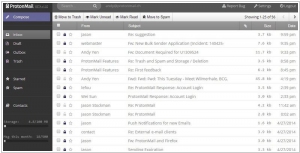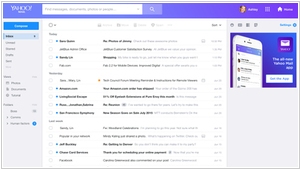ProtonMail vs Yahoo Mail
September 14, 2023 | Author: Adam Levine
See also:
Top 10 Email services for Business
Top 10 Email services for Business
ProtonMail and Yahoo Mail are distinct email services catering to different user priorities. ProtonMail is renowned for its focus on privacy and security, offering end-to-end encryption as a default feature, ensuring that even the service provider cannot access the contents of user emails. It's an excellent choice for those who prioritize data privacy and confidentiality. Yahoo Mail, on the other hand, provides a more traditional and feature-rich email experience with a wide range of services such as customizable themes, news updates, and quick access to calendars. While both services are accessible on various devices, ProtonMail prioritizes security, making it an ideal choice for privacy-conscious users, whereas Yahoo Mail is suited for those seeking a more traditional email experience with a broad array of features.
See also: Top 10 Email services
See also: Top 10 Email services
ProtonMail vs Yahoo Mail in our news:
2023. Encrypted email service Proton Mail gets its own desktop app
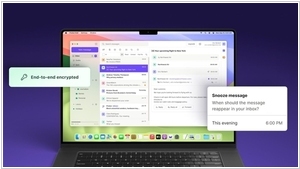
ProtonMail has introduced a native desktop application for both Windows and MacOS platforms. Although the encrypted email service has been accessible to desktop users for nearly a decade, initially through the web and later via a "bridge" facilitating access through desktop clients like Outlook and Thunderbird, the new dedicated desktop app eliminates the need for browsers and bridge middleware. By doing so, Proton, the parent company, aims to establish direct end-to-end email encryption through its own clients, offering offline access. The desktop app is conveniently accessible from the Windows Start menu or MacOS dock and includes integration with Proton Calendar, the encrypted calendar application by Proton.
2023. Yahoo Mail introduces new AI-powered capabilities
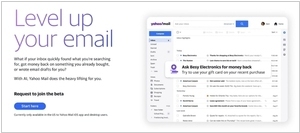
Yahoo is launching some new innovative AI tools for Yahoo Mail, designed to assist users in conserving both time and finances. This deployment encompasses enhancements to numerous pre-existing AI functions within Yahoo Mail, alongside the introduction of a fresh tool known as the Shopping Saver. This novel Shopping Saver tool brings to light forgotten gift cards, discount codes, and store credits, subsequently aiding users in leveraging these resources. Furthermore, the tool generates recommended messages to send to vendors, streamlining the process of applying these savings subsequent to a purchase. According to Yahoo, a significant portion of U.S. adults possess unused gift cards, vouchers, or store credits, with the new tool aiming to facilitate monetary savings during online transactions. Yahoo competitors Google and Microsoft have also rolled out several generative AI-powered features to Gmail and Outlook over the past year.
2021. ProtonMail gets a slick new look, as privacy tech eyes the mainstream
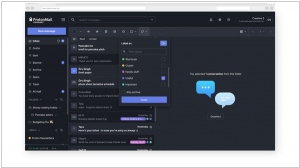
Swiss-based end-to-end encrypted email service ProtonMail has recently unveiled an updated design, offering users a cleaner and more customizable interface. Notably, users now have the option to select from a variety of themes, including dark and contrasting versions. ProtonMail places a strong emphasis on security, with its full integration of PGP (Pretty Good Privacy) ensuring that the gold standard of end-to-end encryption is seamlessly accessible to mainstream internet users. This integration provides users with the technical guarantee that their data remains private and inaccessible to unauthorized parties. While ProtonMail's new look serves as a visually appealing addition to its already robust encryption features, the company acknowledges the increasing importance of design and user interface as its product gains popularity.
2018. Yahoo Mail launches version for mobile web
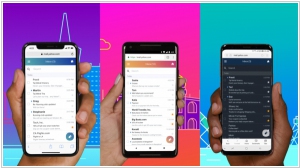
Yahoo has announced the release of two new versions of Yahoo Mail: one optimized for mobile web and another designed specifically for Android Go, an Android variant tailored for more affordable smartphones. The primary objective of these updates is to enhance the mobile web and Android One experiences, with the intention of expanding the user base of Yahoo Mail among different segments of users. The focus is on attracting individuals who utilize lower-end devices, whether in emerging markets or as more casual mobile users in more developed markets. Currently, Yahoo Mail boasts 227.8 million monthly active email users, a relatively modest figure when compared to Gmail's 1.4 billion users reported in April of this year.
2018. Yahoo Mail launches new wave of updates
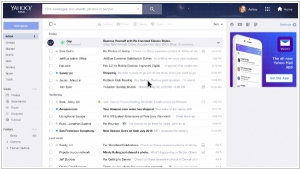
While eagerly anticipating the upcoming major revamp of Gmail, its competitor Yahoo Mail has introduced a series of updates, focusing on enhanced personalization options and improved performance. These updates bring significant improvements, including a notable 50 percent reduction in JavaScript exceptions and a 20 percent decrease in overall API failures. In terms of new features, Yahoo Mail now offers photo themes, allowing users to customize their backgrounds, thus adding visual flair to the otherwise straightforward email service. Additionally, the integration with the calendar has been refined, and the out-of-office responders have become smarter and more efficient.
2015. Encrypted email service ProtonMail open sources its web interface

Secure encrypted email provider ProtonMail, known for its "zero access" PGP mail service based in Switzerland, has taken a significant step by open sourcing its webmail interface. This move allows users to inspect and analyze all the locally running code on their own computers. While ProtonMail had previously open sourced its cryptography code from the beginning, it has now extended this transparency to its webmail client by launching version 2 and making the code available for public scrutiny. The source code for version 2 of ProtonMail's webmail client is hosted on Github. Although ProtonMail has been offering its secure email service for free, the company is set to introduce its first paid accounts in the coming fall. These paid accounts will provide subscribers with additional storage and extra features in exchange for a subscription fee, marking the startup's transition to monetization.
2015. Yahoo Mail gets Xobni-based contact cards
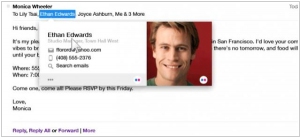
Yesterday, Google made an announcement regarding the revamp of its Google Contacts service. Today, Yahoo is following suit by introducing new "Contacts Cards" in Yahoo Mail, accessible through this link: Yahoo Mail. These cards are small and appear when hovering over a person's name in a message. They provide valuable information about the individual, such as their phone number, job title, company, and even links to their social profiles. In addition to displaying standard information like phone numbers, job titles, and email addresses, the Contact Cards also feature a photo (or a company logo, if applicable) and links to social profiles, including Facebook and Yahoo-owned Flickr. This enhanced system is powered by technology from Xobni, a company that Yahoo acquired in 2013. It's worth mentioning that Xobni was one of the pioneers in developing email add-ons that could gather additional information about contacts directly within the inbox, including data from various social networks.
2013. Yahoo acquired social email-plugin Xobni

Xobni team celebrating with money-boxes from Yahoo. ***
2012. Yahoo! Small Business allows to monitor Social Web
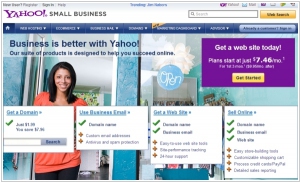
In the past, the Internet giant Yahoo! ventured into business-oriented projects, as evidenced by their acquisition of the collaboration platform Zimbra. However, Yahoo! later formed a partnership with Microsoft and chose not to compete directly with their partner. Consequently, Zimbra was eventually sold to VMWare. Despite these changes, Yahoo! still retains one business-oriented service in its portfolio, namely Yahoo! Small Business. This service empowers small companies and entrepreneurs to easily create a website, set up email accounts, and establish online stores. Over the years, Yahoo! has undergone executive, strategic, and priority shifts, resulting in the closure of several services. However, Yahoo! Small Business has remained operational due to its genuine customer demand and profitability. Furthermore, Yahoo! continues to allocate resources for the ongoing development of this service. Recently, Yahoo! Small Business introduced a free marketing dashboard that enables users to monitor their online reputation across social networks like Facebook and Twitter. The dashboard also offers website metrics analysis, facilitates email campaigns, and provides submission to small business directories. Notably, it incorporates social media monitoring capabilities and offers recommendations for new listing opportunities on platforms such as Yelp, Yahoo, and others.
2011. Xobni turns Email into universal access point to business apps
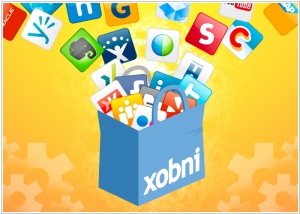
We have already talked about the competition between Email and corporate portals/social tools for the right to be the primary workplace. Initially, this role was fully owned by Email. Then appeared the web-based collaboration systems and social tools that were intended to replace the "outdated" Email. And it seemed that they would kill Email soon. But some clever people invented social Email plug-ins (Xobni, Rapportive, Harmon.ie, Gist, Etacts), that gave the second life to Email-clients. They added social and file-storage functions to the Email. And they're not going to stop. Today Xobni has opened the Xobni Gadget Store - the marketplace for apps, that can be embedded to MS Outlook and turn it into the universal interface to all business systems. ***

